Raising Richmond: Accidentally raising a girl
Is our uneasiness over the “pinkification” of toys sending a message to our daughters that their potentially legitimate preferences are wrong?

My husband and I didn’t find out the sex of our child. Everyone guessed I was having a boy based on which of my ribs were sore the most or which wrist I wore my watch on–I don’t actually remember all the nonsense guessing that everyone played at with my body. I do remember that our midwife said, “I think it’s a boy. But I’m wrong half the time.”
Our child ended up being a girl (in your faces, everyone!). However, she has very short hair, and as recently as yesterday someone called her a little boy, so maybe that’s the vibe all my past coworkers and strangers were picking up on when they guessed I was pregnant with a boy.
When she was an infant, my husband and I were against dressing her “like a girl,” meaning in all pink. We didn’t dress her as a boy, but we didn’t like the idea that she had to wear pink because she was a girl. She certainly had pretty things and dresses, but the more she was mistaken for a boy the less I wanted to dress her more girly because it wasn’t her or my problem that people assumed a baby not wearing a frilly pink headband must have been a male. That’s on the random woman at the grocery store to know better.
My daughter picks out her clothes now, and she tends to wear a lot of pink (a lot). We are not crazy about the pink, but we let her pick, and she chooses it. But she also until recently constantly wore a t-shirt with a skateboarding hotdog on it, or a bright orange shirt printed with cars, buses, and helicopters. She likes to look pretty, and she wants to play pirates. She has pink LEGO, and she has not-pink LEGO.1
When I read this article in The Daily Beast about how making children’s toys too gender-biased is going to impair girls in real life, I could see the value in what was being said. But I had to ask myself if I was making things worse by maybe backhandedly telling my daughter that pink and princess were the wrong choices? I don’t want my daughter to grow up thinking that being a woman is a liability, and she is starting out as less-than. I want her to have choices, and when she chooses what she likes and it happens to be pink or what society deems as appropriate for a little girl, she still made the right choice.
I, as it turns out, am also a woman. I played with My Little Pony and Barbie. When I played with my brother’s toys I was probably still playing house. I don’t really remember princesses being a thing when I was a kid, but I liked to dress up sometimes. I also liked to play alone and make my own paper dolls. I didn’t become a scientist or an engineer. I don’t know if I’m supposed to feel like a failure because of that.
I was never told I couldn’t do anything because I was female until I was 16, and my driver’s education instructor would tell me that I did OK “for a girl,” and constantly railed on his wife and other women as drivers (and in general). When that bullshit was dished out to me I knew it was false immediately,2 and I’ve always been aware of unfair treatment. It helped that I had smart female friends and relatives (and a teacher who encouraged me to use my driver’s ed partner’s real name in the essay I wrote about the experience because she also couldn’t stand him).
I understand the arguments about the “pinkification” of girls’ toys, and I do agree with and recognize the larger issue. What the toys looked like are the choices that companies are making for children, and I’m more concerned that some of the toys my daughter gets limit her imagination. While I love these kinds of discussions, I find arguments about what will ruin our children3 to be fruitless. That’s like going back in the last 30 years and trying to figure out why we aren’t the smartest, most-self-respecting, and healthiest versions of ourselves.4
My kid’s going to have challenges growing up. Some of them may be because she’s female, some of them will be something else (people stop aggressively guessing about your child’s future after the sex is known, so I don’t know what those other things could be yet). I want her to have the tools she needs to grow and learn and develop in subjects that go above what I can help her with. But still, she can pick out and play with whatever she wants as long as she remembers to put it away when she’s done. I think that might mean a little more right now.
Photo by: Robert S. Donovan
- As Sam Davies taught us, LEGO Friends is just LEGO. ↩
- Please refer to my essay about him and my sexist driver’s education partner in your copy of the 1996 Chesterfield County Public School’s literary magazine Write Now! ↩
- Smartphones. ↩
- Facebook. ↩
-
Recommend this
on Facebook -

Report an error
-

Subscribe to our
Weekly Digest




There are 11 reader comments. Read them.